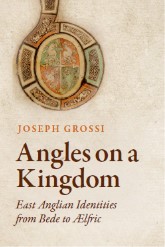of Victoria

BA (Providence College), MA and PhD (Ohio State)
Old and Middle English literature
My primary home at UVic is the English Department, where I contribute both to the Medieval Studies research cluster and to the MEMS concentration. I also teach in the Department of Hispanic and Italian Studies and the Medieval Studies Program. My doctoral dissertation explored the demonization of Rome and Italy in fourteenth- and fifteenth-century English writing, and for the most part my subsequent publications have concerned authors and topics in Middle English literature. Having recently branched out into Anglo-Saxon studies and, on occasion, the Italian Trecento, I’m happy to supervise undergraduate and graduate students in any of the areas in which I work.
Recent courses/modules include ENGL 340 (Intro. to Old English), ENGL 341 (Old English Literature), ENGL 344A (Chaucer: Canterbury Tales), ENGL 344B (Chaucer’s Troilus and Minor Works), ENGL 410 (Backgrounds to English Literary Traditions), ENGL 516 (Special Topics: Studies in Middle English Literature), ITAL 273 (Italian Renaissance), ITAL 472A (Boccaccio’s Decameron), ITAL 472B (Petrarch: His Life as Literature), MEDI 303 (Intro. to the Medieval World), and MEDI 304 (twice: Italian Medieval Travel Narratives; Sea, Swamps, and Saints in Medieval East Anglia). Upcoming courses include ENGL 515 (Studies in Middle English Literature: Chaucer and Italian Literature, summer 2019) and MEDI 401 (The World of Dante’s Divine Comedy, spring 2020).
 Angles on a Kingdom: East Anglian Identities from Bede to Ælfric. Toronto: University of Toronto Press, 2021. Monograph.
Angles on a Kingdom: East Anglian Identities from Bede to Ælfric. Toronto: University of Toronto Press, 2021. Monograph.
“Dante, Peacemaker of the Lunigiana.” Dante Studies 139 (2021): 58-93"
“Jacobus de Voragine.” Invited entry in The Chaucer Encyclopedia. Ed. Richard Newhauser, Vincent Gillespie, Jessica Rosenfeld, and Katie Walter. Chichester: Wiley-Blackwell. Forthcoming.
“Felix and His Kings.” Guthlac: Crowland’s Saint. Ed. Jane Roberts and Alan Thacker. Donington, Lincolnshire (UK): Paul Watkins, 2020. 157-79.
“Fiction from Putrefaction: Hereward in the Wake of Old English.” Early Middle English 1.1 (2019): 91-99.
“Durham.” In The Encyclopedia of Medieval Literature in Britain. Gen. eds. Siân Echard and Robert Rouse. Volume 2. Chichester: John Wiley and Sons, 2017. 713-15.
“The Durham Proverbs.” Encyclopedia of Medieval Literature in Britain. Volume 2. 716-18.
“A Place of ‘Long-Lasting Evil and Unhappiness’: Rædwald’s East Anglia in Bede’s Ecclesiastical History’. New Medieval Literatures 15 (2015 for 2013): 95-118.
“Barrow Exegesis: Quotation, Chorography and Felix's Life of St. Guthlac.” Florilegium 30 (2015 for 2013): 143-65. Invited contribution to the special issue “Interpretive Conflations: Exegesis and the Arts in the Middle Ages,” guest-edited by Gernot Wieland.
“Anti-Petrarchism in the Decameron’s Proem and Introduction?” Quaderni d’italianistica 33.2 (2012): 5-26.
“Preserving the Future in the Old English Durham.” Journal of English and Germanic Philology 111.1 (2012): 42-73.
“Cloistered Lydgate, Commercial Scribe: British Library MS Harley 2255 Revisited.” Mediaeval Studies 72 (2010): 313-61.
“Geoffrey Chaucer,” “Dante Alighieri,” and “John Lydgate.” In An Encyclopedia of Time. Ed. H. James Birx. Thousand Oaks, CA: Sage Publications, 2009.
“Chaucer’s Second Nun’s Tale.” In The Literary Encyclopaedia (online), ed. Robert Clark (Univ. of East Anglia), 2007.
“‘Wher ioye is ay lastyng’: John Lydgate’s Contemptus Mundi in British Library MS Harley 2255.” Leeds Studies in English, new series, 36 (2005): 303-34.
“Imagining Genoa in Late Medieval England.” Viator: Medieval and Renaissance Studies 35 (2004): 387-434.
“John Capgrave’s ‘Smal Pypying’: Marvelling at Rome in Ye Solace of Pilgrimes.” Medievalia et Humanistica, new series, 30 (2004): 55-83.
“The Unhidden Piety of Chaucer’s ‘Seint Cecilie.’” The Chaucer Review 36.3 (2002): 298-309.
“The Question of the King’s Grace in the Alliterative Morte Arthure, 2320.” Notes & Queries 245 (2000): 293-5. Postscript/corrigenda in Notes & Queries, 246 (2001), 40-41.
“The Clerk vs the Wife of Bath: Nominalism, Carnival and Chaucer’s Last Laugh.” Literary Nominalism and the Theory of Rereading Late Medieval Texts: A New Research Paradigm. Ed. Richard J. Utz. Mediaeval Studies series, 5 (Lewiston, NY: Edwin Mellen, 1995), pp. 147-78.
“Fens and Foes: Hereward ‘the Wake’ and the Abbeys of Ely and Peterborough.” Projected monograph.